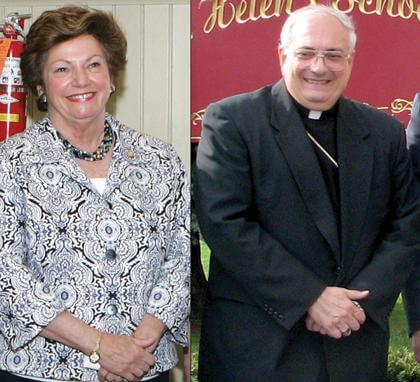By Jeremy Walsh
Controversy is swirling around a bill put forward by state Assemblywoman Marge Markey (D−Maspeth) after news reports said the bishop in charge of the Brooklyn−Queens Diocese threatened to close churches in legislators’ districts if it passed.
Markey’s bill, Assembly 2596, would suspend the statute of limitations on child molestation lawsuits for a year before extending the limit to 10 years after the victim turns 18.
“Opponents of her bill seem to be more concerned about their assets than about children,” said Markey spokesman Mike Armstrong.
Among the elected officials at the Oct. 21, 2008, legislative breakfast at the Brooklyn home of Bishop Nicholas DiMarzio was state Sen. Joseph Addabbo (D−Howard Beach), who confirmed the bishop said several churches in the diocese would likely close if the bill were to pass.
Citing anonymous sources, the New York Post reported DiMarzio told attendees the diocese would publicly blame them for the closures.
“The bishop was very clear in expressing his serious concern,” Addabbo said. “It would cause severe financial hardship on the … Queens Diocese. … To him it was all about the finances, and he expressed his concern that way. It was the first time personally that I heard the frustration come out in the bishop.”
The Rev. Kieran Harrington, spokesman for the diocese, denied DiMarzio’s comments were meant as a threat.
“Anytime he has been asked, he has very publicly said this bill is going to have dire consequences for our diocese,” he said, estimating the bill could cost them as much as $500 million in legal fees and settlements. “Dire consequences means that we would not be able to sustain our parishes and schools.”
The issue is further clouded by a competing bill in the Assembly, sponsored by Assemblyman Vito Lopez (D−Brooklyn). Lopez’s bill would extend the statute of limitations on molestation lawsuits to seven years after the victim turns 18, as opposed to the 10−year extension Markey’s bill proposes.
Lopez’s bill would also waive for sex abuse cases the 90−day window plaintiffs have to sue a public employee or agency for damages after an alleged injury, allowing public school students who claim to have been molested years ago to seek redress.
Neither bill has reached the Assembly floor, with only two weeks left in this year’s legislative session.
Harrington said the Brooklyn−Queens Diocese supported Lopez’s bill.
“It’s curious to me that so many people are attacking the church on this legislation when, in fact, there is a verging problem in our public educational institutions and there doesn’t seem to be concern for that,” Harrington said.
Assemblyman Jose Peralta (D−Jackson Heights), who was not at the legislative breakfast in October but who counts many Catholics among his constituents, said he has received numerous calls from both clergy and parishioners.
“They’re doing all that they can to make sure that this doesn’t come to the floor and if it does come to the floor, it fails,” he said, noting he was not in favor of selectively extending the statute of limitations.
“I think the Lopez bill is more of a tactic being used to sort of defuse the Markey bill,” Peralta said. “At the end of the day, I think the church doesn’t even want the Lopez bill. I think what they are doing is sort of saying we have to choose the lesser of two evils.”
Reach reporter Jeremy Walsh by e−mail at jewalsh@cnglocal.com or by phone at 718−229−0300, Ext. 154.































